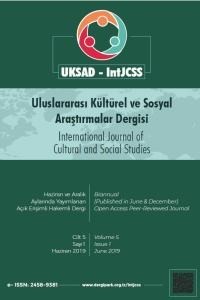LEARNING DISABILITY ON ISHAAN, DYSLEXIC CHARACTER PORTRAYED IN THE MOVIE “LIKE STARS ON EARTH”
Psychological disorder, Learning Disabilities Dyslexia, social aspect,
___
- Alexander-Passe, N. (2006). How Dylexic Teenagers Cope: An Investigation of Self- esteem, Coping and Depression. Published online in Wiley InterScience(www.interscience.wiley.com). DOI: 10.1002/dys.318Alexander-Passe, N.(2015). Dyslexia and Mental Health. USA: Jessica Kingsley Ary, D. (2002). Introduction to Research in Education. Belmont: Wadsworth Thomson Learning. Bararah, V.F. (2010). Pagi yang Seru di Sekolah Khusus Pantara. Retrieved on Wednesday, 4 August 2010, from http://health.detik.com/read/2010/08/04/Begum, S. (2008). Understanding Disability Psycho-Social perspective. USA: Global Books Organisation. Davis, R. D. (1994). The Gift of Dyslexia. USA. The Berkley Publishing Group. Davis, R.D. (1992). 37 Common Characteristics of Dyslexia. Retrieved October 05, 2015 from Davis Dyslexia Association International, Dyslexia the Gift Web site: http://www.dyslexia.com/library/symptoms.htmDevaraj, S., Rosian, S.H., Noah, S.M.,& Mahyuddin, Rahil. (2009). Correlations of Symptoms of Dyslexia with Academic Achievement and Behavioral Problems in a Malaysian Primary School. Journal on Educational Psychology, volume 2 no. 4. Pp74-84 Feb-Apr 2009Dipa, A. (2012). Dyslexic Kids can develop normally with help. The Jakarta Post, Bandung | Archipelago | Tue, April 17 2012, 10:31 AM- See more at: ttp://www.thejakartapost.com/news/2012/04/17/ Dyslexia Association International, Dyslexia the Gift Web site: http://www.dyslexia.com/library/symptoms.htmFitriani, S. & Felina, S. (2018), “Coping with Learning Disability in a Dyslexic Child in Terms of an Instructional Model” in The 1st International Seminar on Language, Literature and Education, KnE Social Sciences, pages 419–426. DOI 10.18502/kss.v3i9.2703International Dyslexia Association (2002). IDA fact sheets on dyslexia and related language-based learning differences: Definition of dyslexia. Retrieved from www.interdys.org/FactSheets.htm Jodrell, D. (2010). Social-Identity and Self-Efficacy Concern for Disability LabelsPsychology Teaching Review, volume 16 no. 2. Pp.111-121 2010Kutscher, M.L. MD, PLLC. (2015). Learning Disabilities. Retrieved on July 2016 from http://kidsbehavioralneurology.com/learning-disabilities.htmlLucid Research Ltd. (2006). Understanding Dyslexia. Retrieved April 3, 2006 from http://www.lucid research.com/documents/factsheets/FS19_ Understandingdyslexia.pdf Nesari, S. J & Kamari, E. (2014).Dyslexic Children and Their Difficulties in Reading Persian Orthography. Advances in Language and Literary Studies, volume 5 no. 4. Pp.17-21 Aug 2014Palti, G. (1998). A Study of the Socio-Emotional Aspects of Educationally Resilient Dyslexic Pupils. Unpublished Doctorate degree at the University of Bristol. Accessed on March 7, 2017 from http://www.dyslexia.co.il/en/articles/social_and_emotional_aspectsofdyslexiaPalti G. (2010): “Specific Learning Difficulties and Mental Health” Retrieved on March 7, 2017 from http://www.spld-matters.com/article11.htmlPayne, Trevor and Elizabeth Turner. (1999). Dyslexia: A Parents' and Teachers' Guide. USA: Multilingual Matters. LTD. Pilgrim, J. (2014). Understanding Dyslexia through the Eyes of Hank Zipzer. Texas Journal of Literacy Education, Volume 2 no 2 .Pp,98-105 Win 2014. Retrieved Mei 5, 2017 from http://files.eric.ed.gov/fulltext/EJ1110944.pdfRyan, M. Dr,. (2004). The International Dyslexia Association (IDA) Fact Sheet #49 05/04. See more at: www.interdys.orgSander, Pl & Stella W. (2010). Our teachers and what we have learnt from them. Psychology Teaching Review Vol. 16 No. 1. Pp.61-69. Texas Education Agency (2014). The dyslexia handbook: Procedures concerning dyslexia and related disorders. Retrieved March 20, 2018, from http://www.decodingdyslexiatx.org/wpcontent/uploads/2014/05/TEA_DyslexiaHandbook_2014-DRAFT-5-12-14.pdf
- Başlangıç: 2015
- Yayıncı: Mutlu TÜRKMEN
Sosyal Paylaşım Siteleri ve Demokratikleşme İlişkisi: Facebook Örneği
Tarihsel Gelişim Sürecinde Filistin'de Gazetecilik, Halkla İlişkiler ve Sosyal Medya
Sosyal Medyada Öz-Temsil ve Ötekiliğin ‘Öteki Boyutu’: ‘Karikateist’ Toplumsalı Üzerine İnceleme
Türkiye’de İllerin Rekabetçilik Düzeyine Göre Sınıflandırılması
Barış Ergül, Arzu ALTIN YAVUZ, Hasan Serhan YAVUZ
Somariah FİTRİANİ, Sherly FELİNA
Vincent Van Gogh’un Sanatında Özdeşleyim ile Varılan Aşkınlık ve Günümüz Doğa Sanatı
